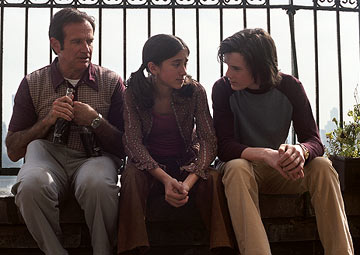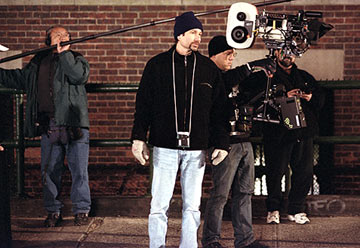
Sorry for the sophomoric title, but I find it difficult to even begin to explain why I performed what is for me an almost unthinkable act: turning off a movie before it was over. Something must be terribly wrong in David Duchovny's writing-directing debut, House of D (2004), for me to do so; after all, since then I've sat through Takashi Miike's interminable bloodbath, Izo (2004), in which a nineteenth century assassin is captured by his enemies and crucified--but it doesn't take, it seems; instead, his death propels him through space and time to mow down everything in his path that even hints at corruption (including schoolchildren and Buddhist priests). And I finished I Drink Your Blood (1970), featuring Satanist-hippies who are fed rabid-dog-blood-injected meat pies and go on a more or less--more less, I suppose--Cronenbergian killing spree, infecting everyone they can bite. AND I left on until the end Alone in the Dark (2005)--admittedly napping through bits n pieces; poor Christian Slater, fighting uninteresting monsters from beyond. (I won't even discuss the Law and Order: SVU episode that I'd already seen but still finished.) Sometimes I wonder if I should rethink this movie-watching effort and become Your Humble Reader instead; aren't there a lot of terrible books I can stop reading in under two hours?
I checked to see if it was just me. First, Ebert: He delivers one of those reviews that are withering precisely because he avoids actually reviewing the movie for about half his text, then ends the review abruptly, like a Three Stooges short. The website Rotten Tomatoes, which gathers reviews and presents an average score, is even more telling: It gives the movie a 10%. Imagine your worst performance in your entire academic career, and I am certain you got more than 10%. So maybe I'm in good company here.
But that doesn't quite explain it. I checked in the category of "contemporary drama" that received between 10% and 20% on the "Tomatometer," and it includes movies I've made it through all the way, and kind of liked: Against the Ropes (13%, 2003), Cold Creek Manor (12%, 2003), and The Chamber (14%, 1996), to name a few. I think we're looking at a thin line here. I noticed that Suspect Zero (2004) received a 16%; I was quite taken with this one, a dark tale with a moral weight. Now, 16% is, what, a 60% better score than 10% (I think; this is why I am not Your Humble Calculator); but jeez-oh-pete, it's still 16%! Again, I'm unsure what happened to House of D. Other reviewers can't help me--much--and arithmetic certainly has let me down.

So I think it's me. No, I know it's me. Duchovny's character is seen in flashback. He's twelve going on thirteen in 1973. I myself was sixteen then. The character attends a boys' Catholic high school. So did I. He's in New York; I was in South Jersey. This is a close enough match, so I can assure you that twelve-year-old boys in the early '70s did not discuss the size of their balls to girls they had crushes on. This is only one small (ha, ha) detail of a movie I found so embarrassingly wrong-headed, so flagrantly selective in its memory, that it proved unwatchable. Case in point: This is a PG-13 movie, and I can attest that, sexual anxiety notwithstanding--oh, that I wish--Catholic school boys may have kissed their mothers with those mouths, but that didn't stop them from cursing like--what can I say in the burgeoning years of the 21st century? Rap stars? The Real World housemates? Their language may be a small matter, but if I couldn't accept the surface reality of the film's world, its emotional reality--and I think there was some of that going on--can only futilely resist the weight of that unbelievable top-layer.
After all this, I must admit I regret not having finished the movie. Given some--OK, many--of my other full screenings, I could have hunkered down and put up with it. Because I also must admit I'm a fan of David Duchovny. Every other weekend or so I watch a DVD-full of X-Files episodes--my son and I are consuming the series in order, little by little--and he is excellent in Return to Me (2000), and doesn't hurt anybody (I couldn't think of anything else to say) in Evolution (2001). I wanted House of D to work. The fact that it didn't doesn't simply tell me it's a bad movie; it reminds me once again how deeply autobiography and memory serve to shape our responses to movies. When I teach, I encourage--implore, exhort, cajole--my students to approach a text objectively--actually, to be honest, from the text's point-of-view, subjectively, then, but from the inside. We aren't Willy Loman or Hamlet or Ethan in The Searchers or Rick in Casablanca; they are. We have to see their worlds as they see them, not as we do, or would like to.
But that is a lie, because it is the self that does all this work; so if the job is immersion in the text, it is the self who immerses--and brings itself with itself, yes? Like Heisenberg's Uncertainty Principle, the act of measurement is not a passive, objective activity, but an intentional action that changes the thing being measured. And to this action great "texts"--and by now this means everything, from a book to a movie to a face on the night train to plate tectonics to the falling of a sparrow--bring one more beautiful, terrible change: in the measurers ourselves. So we change the movie, but the good movie also changes us. It's just that House of D had no power to do the latter.
No comments:
Post a Comment